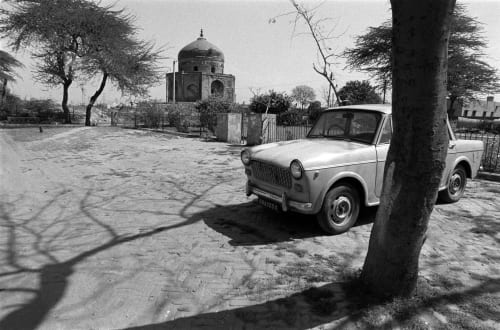Indian-Canadian, London-based artist Sunil Gupta is a pioneering photographer, writer, curator and activist, whose often theatrical artistic engagements are armed, autobiographical interventions into mainstream cultural consciousnesses to re-center subjects such as racism, alternative sexuality, migration, queer issues and marginalia. At the heart of Gupta’s practice is narrative assemblage; he explores the nature of conflict as expression and modality, placing it on historical, geographical and socio-political precipices that beset a discursively powerful, personally resonant and at times playful call to action. His expressionist politics enrich post-modern queer theory, which argues against the essential or pre-determined self in favour of dynamic, collective possibilities.
In this crucial, never-before-exhibited series of black-and-white photographs shot in the 1980s titled Cruising 1960s Delhi, Gupta composes a revisitation of a revisitation, a memory of a memory, contemplating personal movements of significance after he returned to Delhi for the first time on leaving the city as a teenager. With the lens as a buttress, the artist pursues a vivacious remembering of the nameless experimentations he encountered as a plucky, pubescent boy discovering his queerness through a sexual awakening. While these photographs seem to offer an architectural positivity, their potency unfolds in the moorish nooks and crevices of frequented local public areas in Delhi around the iconic Nizamuddin neighbourhood, as well as Gupta’s own house and its back-lane bifurcations, representing the geography of his childhood, where a complex, indeterminate freedom, outside the confines of language and social control, was performed in sexual exploits with other boys, some of them older and from different socioeconomic classes. In the cathartic re-enactment of reconciling with this emotional landscape years later, Gupta uncovers the trauma of separation that he describes as the loss of his otherwise idyllic childhood, particularly noting the redaction of childhoods in queer experiences in the West, where such curiosities are considered more illicit than
liminal.

